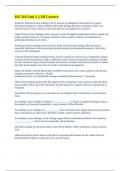ISS 310 Unit 2 || All Correct.
Prisoner's Dilemma (from reading) correct answers An allegorical description of a game-
theoretical situation in which multiple individuals making decisions in pursuit of their own
interests tend to create collective outcomes that are non-optimal for everyone.
Game Theory (from reading) correct answers A form of applied mathematics used to model and
predict people's behavior in strategic situations where people's choices are predicated on
predicting the behavior of others.
Institutions (from reading) correct answers Rules and norms governing collective action,
especially referring to rules governing common property environmental resources, like rivers,
oceans, or the atmosphere.
Common Property (from reading) correct answers A good or resource (e.g., bandwidth, pasture,
oceans) whose characteristics make it difficult to fully enclose and partition, making it possible
for non-owners to enjoy resource benefits and owners to sustain costs from the actions of others,
typically necessitating some form of creative institutional management.
Match the thinker with the phrase they are BEST associated with: correct answers only private
property can protect resources - Hardin
traditional society can successfully manage commonly held resources - Townsend
Which of the following describes the tragedy of the commons? correct answers when the short-
term, positive effects go to the individual, and the long-term, negative effects are spread out to
the group.
True/False. Private property is a universal way of relating to the environment. correct answers
False
According to your reading of Chapter 5, _____________ is likely to support hunting as long as
the animals are harvested sustainably. correct answers Gifford Pinchot
According to your reading, the ___________ view of human nature argues that any part of nature
that is unused has no value and is therefore wasted. correct answers utilitarian
According to your readings, social ecology argues that environmental problems are caused by
______________ . correct answers inequality among humans
John Muir argued for the preservation of the Hetch Hetchy Valley wilderness. correct answers
True
anthropocentrism correct answers the ethical viewpoint that humans are the central factor in
determining the right or wrong way to act toward nature.
, animal liberation correct answers Peter Singer's book and a social movement to free all animals
from human use.
conservation correct answers natural resources should be used, but their use should be
sustainable and efficient.
common property correct answers or "the commons," any good or resource that is not easily
enclosed, making it possible for many people to use and for owners to enjoy benefits but pay for
costs due to others' use; usually, the commons must be managed by law, collaboration, or
institutions, yet Hardin's supporters suggest it is best managed through privatization.
dominion thesis correct answers humans are separate and superior to nature; humans should
control nature and use it how they see fit.
ecocentrism correct answers the ethic that any use of the environment should be focused on what
is best for its ecology, not humans.
environmental justice correct answers a principle stressing the need for an equitable distribution
of environmental goods (clean air, parks, healthy working conditions) and environmental bads
(pollution, toxic waste, hazards, unsafe parks).
individualistic society correct answers egocentric society
institutions correct answers a society-wide web of roles, statuses and rules to meet a societal
need, such as the institution of law, education, or family, here referring to rules managing
common environmental resources like rivers, atmosphere and oceans.
intrinsic value correct answers the value of a natural object (river, eagle) in and for itself.
instrumental value correct answers the value of a thing for the desired end, such as market value.
land ethic correct answers the idea that an action is right when it promotes the healthy and
sustainable functioning of an ecosystem (plants, animals, land and humans).
moral extensionism correct answers to expand human ethics to non-human entities, such as land,
water, plants, and animals.
preservation correct answers the idea that humans should not exploit nature, it should be
protected for "nature's sake".
social Darwinism correct answers the theory that people are subject to the same Darwinian laws
of natural selection as plants and animals, is now primarily discredited since it was used to
justify political conservatism, imperialism, and racism and to discourage any kind of social
services and support.
sociocentric society correct answers collectivist society




